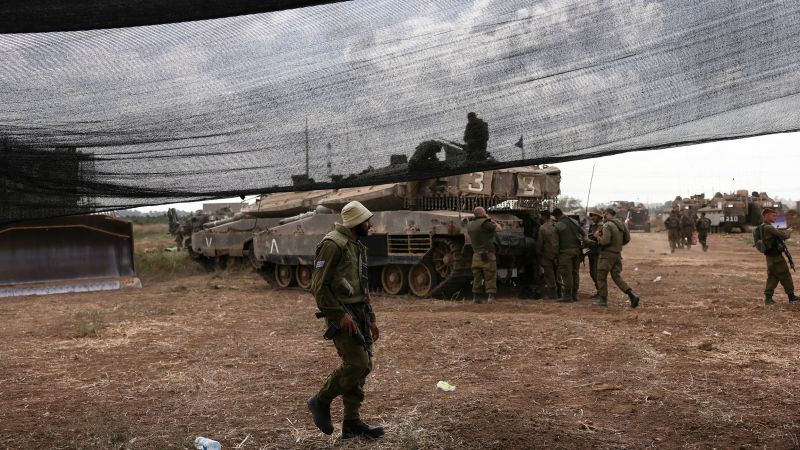The US and its allies have been urging Israel to be strategic and clear about its goals if and when it launches a ground invasion of Gaza, warning against a prolonged occupation and placing a particular emphasis on avoiding civilian casualties, US and Western officials told CNN.
In private discussions with their Israeli counterparts, Western defense officials have not tried to dissuade Israel from moving into Gaza with ground forces, the sources said. But they have emphasized that Israel should have clear objectives when it comes to degrading Hamas and seeking to avoid a long-term occupation of the Gaza Strip.
“Our advice to them isn’t ‘Don’t do it,’ because we completely respect their right to go after Hamas and that means going after them wherever they are,” a NATO defense minister told CNN. “So it’s not ‘Don’t do it,’ but it is ‘Think about what happens and have a strategy, not just a tactical maneuver.’ We expect Israel to act within international humanitarian law, but we understand that they’re dealing with an enemy here.”
President Joe Biden expressed a similar sentiment in an interview with “60 Minutes” last week. While he said that “taking out the extremists is a necessary requirement” for Israel, “Hamas and the extreme elements of Hamas don’t represent all the Palestinian people. And I think that it would be a mistake for Israel to occupy Gaza again.”
And on Wednesday, while in Tel Aviv, Biden warned in public remarks that wartime leadership “requires clarity about the objectives and an honest assessment about whether the path you’re on will achieve those objectives.”
An Israeli official confirmed that these discussions with the US and other allies are taking place. A separate senior Israeli official said Friday that “Israel is well aware of the humanitarian issues and is taking steps to address it in cooperation with the US government. It’s Hamas who has turned the 2 million people of Gaza into a human shield.”
Earlier this week, Israel’s ambassador to the UN, Gilad Erdan, told CNN that Israel has “no interest” in occupying Gaza, although Israeli officials have warned the operation there will be lengthy.
Hamas is also believed to be holding over 200 hostages, who could be endangered if Israel invades. The group released two American hostages, a mother and her daughter, on Friday.
US officials don’t yet have a clear sense for Israel’s intentions in Gaza and believe it will be difficult for Hamas to be eradicated entirely.
At least publicly, Israeli officials have articulated their plans only in broad strokes, saying that the goal is to eliminate Hamas and its infrastructure.
“Our responsibility now is to enter Gaza, go to the places where Hamas organizes, operates, plans and launches,” Israel Defense Forces Chief of the General Staff Herzi Halevi said Sunday, according to Israeli newspaper Haaretz. “To hit them severely everywhere, every commander, every operative, and to destroy infrastructure. In one word – to win.”
In 2014, Israeli Prime Minister Benjamin Netanyahu set out to debilitate Hamas with the last ground invasion into Gaza. While that war dealt Hamas a significant blow, it was a huge challenge, and Israel hasn’t attempted another incursion since.
There is also a rising concern that a ground invasion could further inflame tensions in the region, officials explained, which heightened after a hospital blast in Gaza that Israel and Hamas have blamed on each other. The US has assessed that Israel was not responsible but has yet to conclusively identify a culprit.
Protests have erupted across the Arab world in the wake of the hospital explosion, and a large-scale and seemingly indiscriminate Israeli ground incursion into Gaza could fuel further unrest, US and Middle Eastern officials told CNN.
US troops have already been attacked multiple times in recent days in Iraq and Syria, with drones and rockets targeting coalition bases there. And Hezbollah – the Iranian-backed militant group in Lebanon – has threatened further action if Israeli boots step into Gaza.
“I think we all understand the importance of the information warfare spare,” said one source familiar with US intelligence. “Whatever they do, it needs to be thoughtful and deliberate.”
US officials also fear that a particularly bloody assault on Gaza could risk drawing Hezbollah, to the north, or even Iran into the conflict. Right now, multiple officials familiar with US and Western intelligence say, it appears that neither Tehran nor Hezbollah are particularly keen to intervene directly. But if there is a parade of images of Palestinians suffering under an Israeli assault, their domestic politics could shift.
A senior US official told CNN that among the benefits of Biden’s trip to Israel this week was that it “buys us some time” when it comes to a potential Israeli ground incursion. It was generally understood before the trip that Israel would not escalate in Gaza while Biden was visiting, the official said.
The official added that the longer the Israelis hold off on this kind of military operation the better, because it allows Israel to plan more strategically and not respond as emotionally to the horrors of October 7.
Jonathan Panikoff, a former senior intelligence analyst specializing in the region, told CNN that “the good news is they (Israel forces) have taken the time. They didn’t go immediately and launch a ground operation the next day. I think the president deserves some credit for buying time.”
But Panikoff added that any kind of ground operation won’t be quick or easy, because urban warfare in such a densely populated area is a unique challenge – especially in a place where Hamas is embedded with the civilian population.
“I don’t think that necessarily the goal (of Biden’s trip) was to prevent a full-scale invasion,” he said. “I think the goal was to show clear support (and) to understand Israel’s strategy of what comes after an invasion if Israel is successful in decimating Hamas. What’s the plan for governance in the Gaza Strip?”
Read the full article here





